Today we are going to tap for Discipline.
Thanks for taking part in the 30-Day Tapping Challenge!
Don’t forget to sign up to receive daily reminders so that you don’t miss a day of tapping.
If you liked today’s video, please share it with a friend.
Today we are going to tap for Discipline.
Thanks for taking part in the 30-Day Tapping Challenge!
Don’t forget to sign up to receive daily reminders so that you don’t miss a day of tapping.
If you liked today’s video, please share it with a friend.
Today we are going to tap for Serenity.
Thanks for taking part in the 30-Day Tapping Challenge!
Don’t forget to sign up to receive daily reminders so that you don’t miss a day of tapping.
If you liked today’s video, please share it with a friend.
Today we are going to tap for Optimism.
Thanks for taking part in the 30-Day Tapping Challenge!
Don’t forget to sign up to receive daily reminders so that you don’t miss a day of tapping.
If you liked today’s video, please share it with a friend.
Today we are going to tap for Compassion.
Thanks for taking part in the 30-Day Tapping Challenge!
Don’t forget to sign up to receive daily reminders so that you don’t miss a day of tapping.
If you liked today’s video, please share it with a friend.
Today we are going to tap for Calm.
Thanks for taking part in the 30-Day Tapping Challenge!
Don’t forget to sign up to receive daily reminders so that you don’t miss a day of tapping.
If you liked today’s video, please share it with a friend.
Today we are going to tap for Determination.
Thanks for taking part in the 30-Day Tapping Challenge!
Don’t forget to sign up to receive daily reminders so that you don’t miss a day of tapping.
If you liked today’s video, please share it with a friend.
Today we are going to tap for Teachability.
Thanks for taking part in the 30-Day Tapping Challenge!
Don’t forget to sign up to receive daily reminders so that you don’t miss a day of tapping.
If you liked today’s video, please share it with a friend.
Today we are going to tap for Understanding.
Thanks for taking part in the 30-Day Tapping Challenge!
Don’t forget to sign up to receive daily reminders so that you don’t miss a day of tapping.
If you liked today’s video, please share it with a friend.
Today we are going to tap for Energy.
Thanks for taking part in the 30-Day Tapping Challenge!
Don’t forget to sign up to receive daily reminders so that you don’t miss a day of tapping.
If you liked today’s video, please share it with a friend.
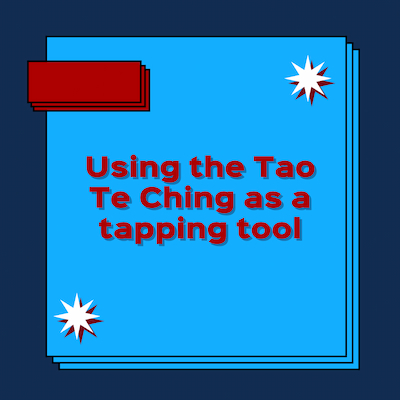 When we are tapping there is no such thing as the “right” or “best” words to use in our tapping phrases. There are words and phrases that are useful, and there are words and phrases that aren't useful.
When we are tapping there is no such thing as the “right” or “best” words to use in our tapping phrases. There are words and phrases that are useful, and there are words and phrases that aren't useful.
One set of phrases might work perfectly one day, but not so well the next.
The words we use are often related directly to what is going on in our lives, what we are feeling in our body, or what issue we would like to clear.
But it doesn't have to be that way. Sometimes the most useful words are written by someone else that we didn't even know we needed to tap on.
Over the last few weeks I have been doing a little experimental tapping work in what I call The Tapping Lab. (You can read more about the lab here.) One of the experiments that I did was tapping to an English translation of the Tao Te Ching.
In that process I came across a chapter that turned out to contain the perfect tapping phrases for me.
In this week's podcast I share my experience of tapping with the Tao Te Ching, how you can do the same with this (or any) text, and I share with you the chapter that resonated so powerfully for me.
You can even tap along with me on how to create new and healthier ways of showing up in the world.
Subscribe in: Apple Podcast | iPhone | Android | Google Podcast | Spotify | Pandora | Amazon Music | iHeartRadio
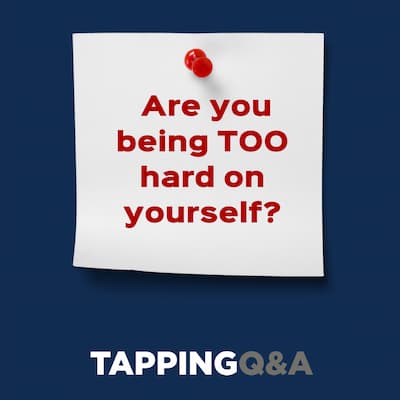 I am always open to feedback from my readers, even when it is critical. We are all notoriously bad eyewitnesses to our own experience, so this sort of feedback can be helpful in understanding how we are perceived by others.
I am always open to feedback from my readers, even when it is critical. We are all notoriously bad eyewitnesses to our own experience, so this sort of feedback can be helpful in understanding how we are perceived by others.
One piece of feedback that I have heard a number of times in the last few months is that I come across as very hard on myself.
I think this is down to two reasons.
First, in an effort to share my experience with you so that you can avoid some of the mistakes I have made, I tend to focus on my past struggles in my writings and recording.
Second, I am probably hard on myself more often than I should be!
In this week's podcast I explore the line between being overly self-critical and being honest with ourselves so that we can create meaningful change in our lives.
I then do some tapping on the issue, which I think you too may find useful.
Subscribe in: Apple Podcast | iPhone | Android | Google Podcast | Spotify | Pandora | Amazon Music | iHeartRadio
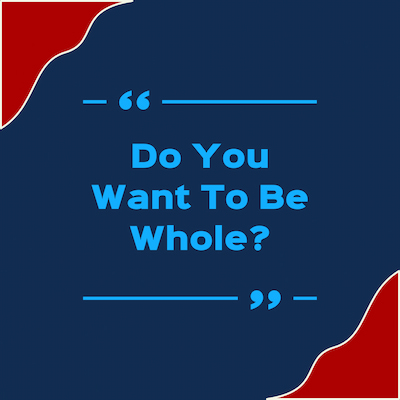 A few weeks ago I was lucky enough to be one of the speakers at the 2022 Energy Fest put on by Donna Eden and David Feinsten. I wasn't just lucky to be in the room, but also to have the opportunity to hear presentations from world-class speakers who are doing some of the most provocative healing work out there.
A few weeks ago I was lucky enough to be one of the speakers at the 2022 Energy Fest put on by Donna Eden and David Feinsten. I wasn't just lucky to be in the room, but also to have the opportunity to hear presentations from world-class speakers who are doing some of the most provocative healing work out there.
One of those speakers was the transcendent Dr. Thema Bryant. I do not have the words to describe the force of nature that this woman is. Her presentation was worth the price of admission alone.
At one point during Dr. Bryant's presentation, she asked the question “Do you want to be whole?” The audience quickly and enthusiastically screamed back “YES!”
Dr. T paused, smiled a smile as radiant as one thousand suns, and asked “Are you sure?”
She then proceeded to talk about what is required to be whole. The question then wasn't really “Do you want to be whole?”, but instead “Are you willing to do the work that is required to be whole?”
That is a much deeper (and harder) question to answer.
I went directly from the Energy Fest to boarding a cruise ship with my family to sail up the Northeastern coast of the US and into the Maritime provinces of Canada. This gave me a lot of time to stare over the ocean and ponder this question.
This week in the podcast I share what that question stirred in me. I have also included some of the tapping prompted by my reflection as I pondered the process of becoming whole.
Subscribe in: Apple Podcast | iPhone | Android | Google Podcast | Spotify | Pandora | Amazon Music | iHeartRadio
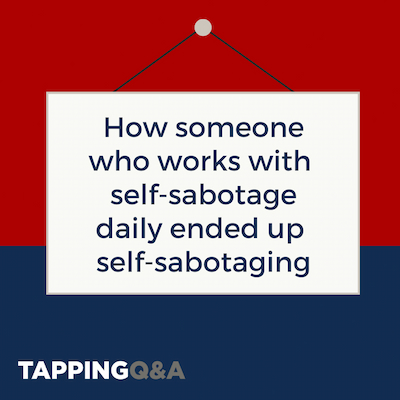 I am incredibly proud of the 24 Hours of Tapping and the fact that we raised over $31,000 for the Peaceful Heart Network.
I am incredibly proud of the 24 Hours of Tapping and the fact that we raised over $31,000 for the Peaceful Heart Network.
What you don't know is that a key reason why I ran the event is because I was running away from something else. That wasn't the only reason I ran the event. It wasn't the primary reason I ran the event. BUT it was a major factor in running the event.
In this week's podcast I share with you what I was running from, why I was running, and the lessons I learned from finally facing my fears.
I hope my struggle is instructive in helping you to identify and overcome when you are running away from something important in your own life.
Support the podcast! Http://tappingqanda.com/support
Subscribe in: Apple Podcast | iPhone | Android | Google Podcast | Spotify | Pandora | Amazon Music | iHeartRadio
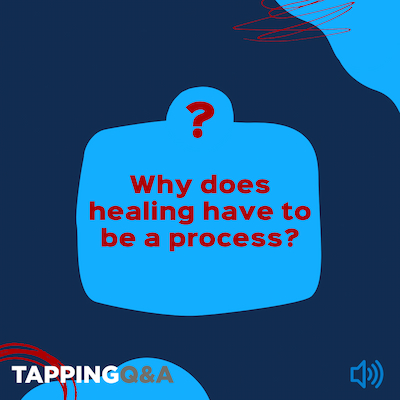 One of the biggest frustrations of the tapping process is the fact that it is a process. One-minute miracles do exist, but they are rare.
One of the biggest frustrations of the tapping process is the fact that it is a process. One-minute miracles do exist, but they are rare.
Naturally, part of us would like transformation to happen immediately, while another part of us understands that healing is more often a process that takes time. When these two parts are in conflict, it can slow down your healing progress.
In this week's podcast, I share how to manage this sort of internal discord so that you can smooth the way for more rapid and lasting healing.
You can find the full tapping script of this audio as a pdf over at Tapping Q and A Podcast Scripts and Transcripts.
Subscribe in: Apple Podcast | iPhone | Android | Google Podcast | Spotify | Pandora | Amazon Music | iHeartRadio
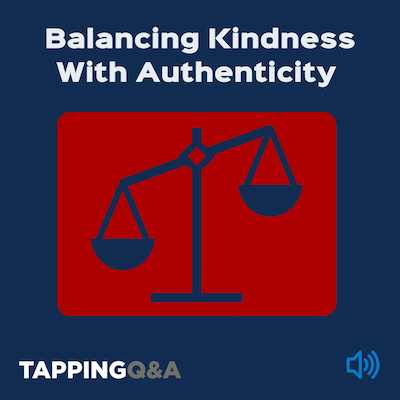 Recently I was working with a client who was struggling with her wish to communicate some hard truths with certain friends in her life.
Recently I was working with a client who was struggling with her wish to communicate some hard truths with certain friends in her life.
She felt stuck because she knew that her friends would not like what she wanted to share. On one hand, she knew what she needed to say AND at the exact same time, she did not want to be unkind.
Sometimes we find ourselves in a situation where our desire to be authentic and our desire to be kind are in conflict.
In this week's podcast we talk about (and tap for) finding a balance between being kind and being a doormat.
Support the podcast! Http://tappingqanda.com/support
Subscribe in: Apple Podcast | iPhone | Android | Google Podcast | Spotify | Pandora | Amazon Music | iHeartRadio
 In the last few months I have been giving a lot of thought to the nature of tapping and its applications. For the longest time I have thought of tapping as an approach to creating transformation.
In the last few months I have been giving a lot of thought to the nature of tapping and its applications. For the longest time I have thought of tapping as an approach to creating transformation.
I am starting to change my mind about this.
Instead of being a single approach, I begin to understand tapping as a tool that can accommodate multiple approaches that are dictated by the issue we are working on, the skill of the tapping practitioner, and whether we are working alone or with someone else.
The first level of analysis involves developing my understanding of what the healing process looks like for a particular issue.
Recently, I have been describing this with the help of an analogy involving motorcycle jumps and lily pads. In this week's podcast I talk about the difference between these two approaches and how they can make all the difference in the transformation that you can achieve with tapping.
Subscribe in: Apple Podcast | iPhone | Android | Google Podcast | Spotify | Pandora | Amazon Music | iHeartRadio
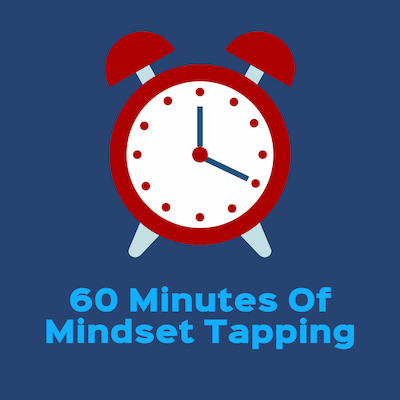 Last weekend I did a one-hour livestream tap-along and took recommendations from the viewers as to which topics we should tap on.
Last weekend I did a one-hour livestream tap-along and took recommendations from the viewers as to which topics we should tap on.
During that hour we tapped on:
Below you will find the recording of the live stream from YouTube as well as an mp3 version of the tap-along that you can download and take with you.
Subscribe in: Apple Podcast | iPhone | Android | Google Podcast | Spotify | Pandora | Amazon Music | iHeartRadio
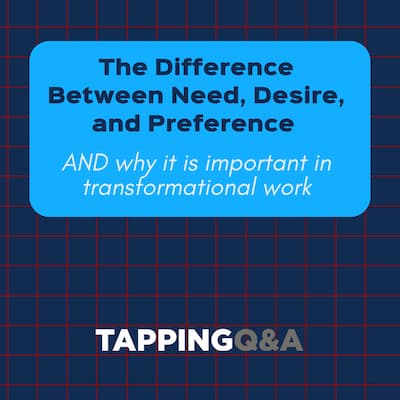 One of the concepts from my NLP training that has stayed with me is the idea that we don't emotionally respond to how the world is, but instead to how we describe the world.
One of the concepts from my NLP training that has stayed with me is the idea that we don't emotionally respond to how the world is, but instead to how we describe the world.
An example I often use is of someone saying “Everyone at work hates me!” It is possible that everyone at work might hate the person making that claim, but it is unlikely to be everyone.
BUT if that is how work is described, then the person saying this will walk into their office with their guard up, fearing every interaction with their co-workers.
In this week's podcast we dive into the difference between need, desire, and preference, and how you can incorporate this understanding into your tapping practice to allow for more rapid personal transformation.
Support the podcast! Http://tappingqanda.com/support
Subscribe in: Apple Podcast | iPhone | Android | Google Podcast | Spotify | Pandora | Amazon Music | iHeartRadio
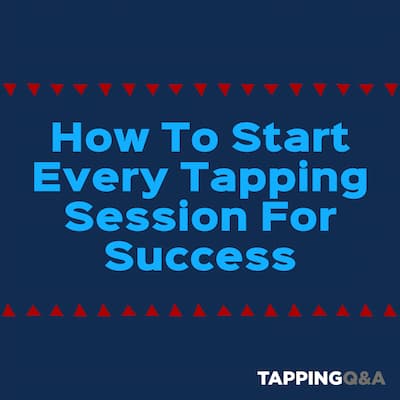 One of the biggest struggles reported by tappers when tapping on their own is knowing where to start and what to say. When we sit down to tap, all we often know is that we don't feel great.
One of the biggest struggles reported by tappers when tapping on their own is knowing where to start and what to say. When we sit down to tap, all we often know is that we don't feel great.
In this week's podcast I share two phrases that you can use to start any tapping session to start you off on the right foot.
When you use these two simple phrases one of two things happen next. Either the phrases will get you going and your intuition will take over and lead you to what you should tap on next OR you can keep using the phrases over and over again, leading you to the relief you are seeking.
Even more important than these two phrases is the fundamental concept of healing on which they are based. I believe that this simple concept is one of the most important foundations of any kind of healing and personal transformation work.
Listen to the podcast to hear more about this idea and how you can incorporate it into your tapping.
Listen and learn!
Support the podcast! Http://tappingqanda.com/support
Subscribe in: Apple Podcast | iPhone | Android | Google Podcast | Spotify | Pandora | Amazon Music | iHeartRadio
[Note: There is no audio-only version of this presentation as it requires the visuals to be fully understood. Full video presentation below.]
When thinking about the world, a common cliché that actually helps to guide the way I work is: Once is an anomaly. Twice is a coincidence. Three times is a pattern.
Some years ago I had a group of clients who were working hard to clear their past issues and create space for transformation, but at a certain point their progress plateaued.
We tried everything: Inner child work, timelines, wordless tapping, and anything else we could think of to try to surface any remaining memories or tailenders.
If this had only happened to one client, then I would have assumed that “we just haven't found the right issue yet.” Since there were numerous clients struggling with this same problem (see cliché above), I figured there had to be more to it.
With a lot of thought and exploration, I came to the realization that there was a habitual nature to their emotional response, meaning that the emotions they were feeling had nothing to do with whether or not we had cleared the right issues.
The emotions were just a habit!
AND because they were just a habit, tapping for a past memory or limiting belief wouldn't shift them.
Here is a short video showing how emotional habits are formed and how we can use tapping to change those habits after we clear the root causes of an issue.
Subscribe to more videos like this: YouTube
Subscribe in: Apple Podcast | iPhone | Android | Google Podcast | Spotify | Pandora | Amazon Music | iHeartRadio